Queensland’s Coggan Family Farms produces beef, sheep and grain
Coggan Family Farms is a leading force in innovation. Here’s how they use Swarm Farm Autonomous sprayers and cattle collars to improve efficiency.
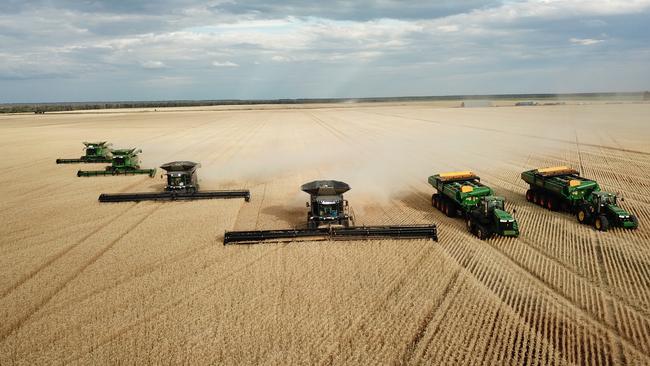
Producing three proteins with one vision is the ultimate goal for one of Australia’s leading integrated farms.
Coggan Farms, based at Meandarra on Queensland’s Western Downs, five hours west of Brisbane, is the definition of a mixed farm, producing beef, grain and lamb across 22,257ha.
With cattle and lamb feedlots, dryland and irrigated cropping, extensive grazing and a Meatmaster sheep stud, the Coggan Farms prides itself on being vertically integrated, while using state-of-the-art technology and sustainable farming practices.
Fifth-generation on the farm, 25-year-old Tom Coggan said they focused on “producing three proteins”, being beef, lamb and grain, which all complemented each other.
“Just from a risk point of view, it is rare those three industries would be suffering at the same time,” he said.
Coggan Farms was originally a Merino sheep stud based at Inverell, NSW, in the early 1930s, before the family moved to the current Enarra property in 1937, where they have continued to develop it over the past five generations.
Now, the multi-generational enterprise is run by Phillip and Cindy Coggan, alongside their son Tom, with their daughters, Emily and Sarah currently pursuing further education as they prepare to return to the farm.
The Coggan family were pioneering wheat growers in the Inglestone area, growing their first wheat crop of 32ha in 1952, and one of the first growers north-west of the Queensland and NSW border.
And that legacy has seen them grow to produce 12,000ha of grain, with chickpeas, barley, wheat and sorghum the main crops, while canola will likely be added to the rotation soon for soil health and corn is also grown when moisture allows.
They also have a multi-species feedlot that was first built in 1978 and now has about 6000 head on-feed currently between sheep and cattle, they also run about 600 breeding cows and 3500 breeding ewes, depending on the season.
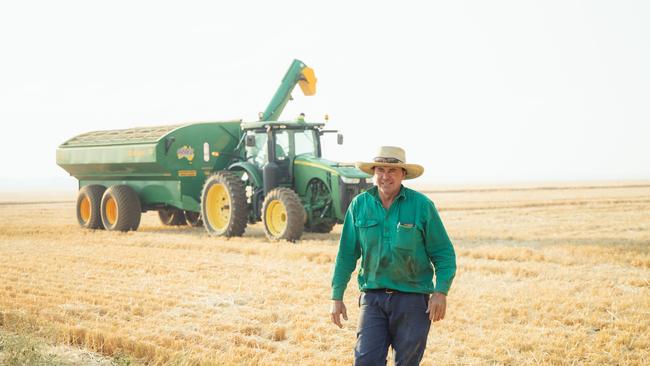
EXPORTS A WINNER
“As the crop side of the business has grown, the feedlot has grown too as we can supply our own feed, and they complement each other really well.”
They have recently gone from one sheep feedlot shed to three, after receiving a Rural Agricultural Development Grant (alongside a co-contribution from Coggan Farms) to help build a new sheep feedlot and dual-purpose quarantine shed.
From this development, the Coggans were one of four finalists for Regional Exporter at the Queensland Premiers Exporters awards in September.
Tom said the quarantine facility aims to meet the export protocols for potential transfer trade deals with Papua New Guinea and Vanuatu.
“The Pacific Islands and Middle East are also looking to improve their sheep meat quality but just don’t have the stock over there, and as a result they have shown interest in our products so there’s potential for trade with those countries,” he said.
While the additional feedlot capacity will help them fulfil domestic contracts, Tom said they were looking to export sheep about five years ago, but the closest quarantine facility was in South Australia.
“We were aiming to diversify our markets and the grant meant we were able to finish construction.”
Tom said they were able to send their first shipment of 300 sheep to PNG in November last year, which was part of a program to improve sheep genetics in that country.
“We developed the facilities with hope that we would be able to export sheep, and it was great to be able to meet the regulations and do it successfully.”
Part of being a virtually integrated “closed” system means all feed for the feedlot is grown on-farm (except cottonseed and supplements).
The livestock are fed a total mixed ration, which is mixed on farm, however consultants such as a nutritionist and agronomist are used regularly.
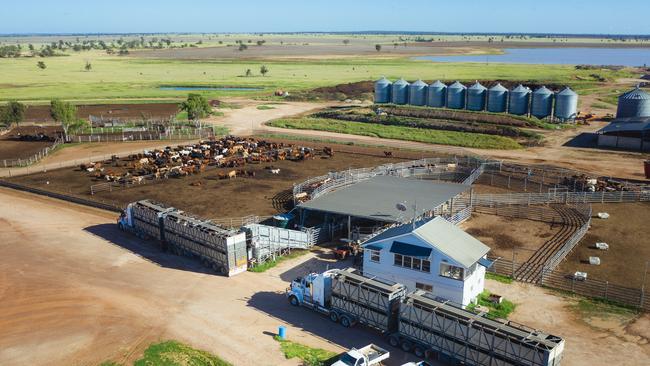
RAIN FARMERS
Part of what makes Coggan Farms successful is the integration of the three protein businesses and taking opportunities when they can.
“We’re grain farmers at heart but we are essentially rain farmers, we do what the rain does,” Tom said.
With an average annual rainfall of 550mm to 625mm, Tom said every decision they made was completely seasonally dependant.
The crop rotation each year is worked out depending on the rain, agronomic factors, market factors and prices.
They aim to double crop and irrigation is used to help with this.
Average yields are 1.5 tonnes/ha to 3.5 tonnes/ha.
The Coggans do all sowing, harvesting, spraying and management in-house.
“Logistically it can be a challenge, but it is also risk mitigation too. We own our own machinery, so we aren’t waiting for contractors or trying to source people,” Tom said.
“In a year when it could be really profitable, we aren’t waiting to be able to sow or harvest, because everyone else will be trying to source contractors too.”
Camera sprayers are used which has reduced chemical usage, while five weather stations are situated across the farm to help determine soil moisture.
“With a long history here, we have a sound understanding of how much rain we need to get a crop.”
Tom said they planted on soil moisture once they had it, or if there was a good forecast, they didn’t do a fixed-date.
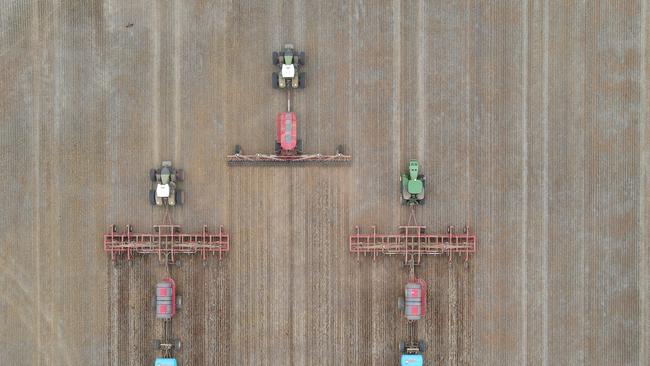
VERSATILE SHEEP
Coggan Farms currently supplies local markets including Woolworths and export markets with their beef.
Cattle are mostly traded for the feedlot, and most are bought in at 350-450kg and fed to reach 500kg-plus to 700kg.
Their 600 breeding cows are made up of Angus and Speckle Park
For the sheep, now they have expanded that side of the feedlot they are focusing on trading more sheep.
However, they also run their own Meatmaster stud with about 500 ewes and commercial flock with 2000 ewes.
In 2011, after having Merinos for many years, they started the Meatmaster stud, a breed that combines White Dorper, Van Rooy, Wiltshire Horn and Damara genetics.
The Meatmaster sheep have high twinning rates, they are versatile, have short hair which means no shearing, while also having no external parasite issues.
“We could see there was a market there and it added anther avenue stream to our protein mix.”
All sheep enter the feedlot at 25-45kg, depending on the season, and what market they were aiming for.
“We like to lock in a forward contract if we can and for the last five months we have been able to do that.”
“It helps knowing we can make a good profit before they enter.”
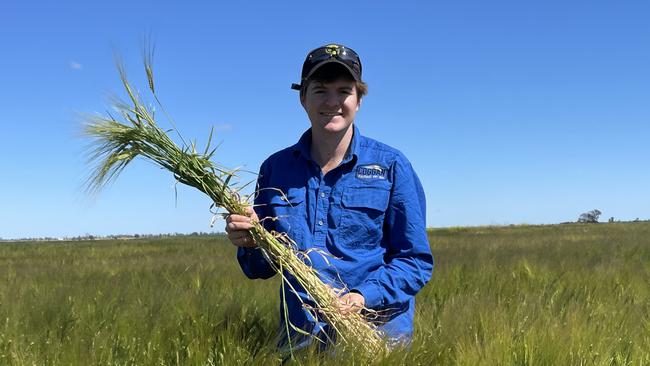
TECH PLAYS ROLE
Making the best use of technology is also a huge part of Coggan Farms.
In 2022 they started using two Swarm Farm Autonomous sprayers, which have now done 6000 hours and covered 60,000ha.
Tom said he saw the robots in action at a field day and thought the task they performed – spraying weeds – was boring and took up labour.
“Dad was really keen on implementing them and we haven’t reduced our staffing because of it, we have been able to repurpose that labour.”
They have also recently introduced cattle collars for a virtual fencing system.
“It is mostly for land use efficiency. We need every square metre of land now, due to land prices, interest rates and input costs, so we don’t have fences across a lot of the property so we can utilise all the land.
“The cattle collars means we can utilise grass country between the crop country without having to build a fence.”
Another piece of technology that has helped with efficiencies is a cattle counting camera.
“It gives us validation of the numbers going on and off trucks. So we have video footage of the cattle and also the count.”
“A fair bit of research goes into all of this technology. I had known about the cattle collars for three years and knew we would introduce them, it is just waiting to be able to do it when it is economical.
“We also don’t just introduce technology for the sake of it, all three of those recent investments are there to help us make money.
“We have always been happy to help develop technology and do trials, but we want these things to be commercially available and economical.”
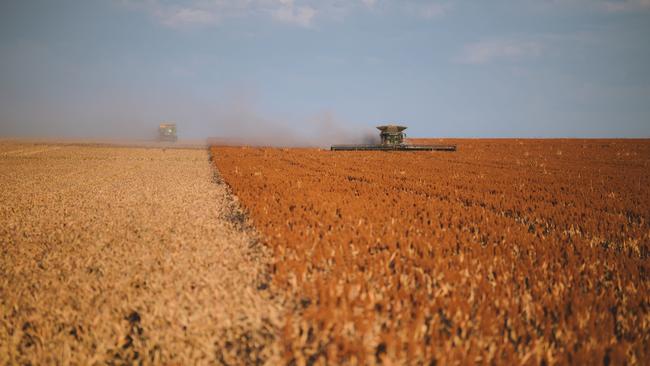
STAFF KEY ASSET
The intensity of the Coggan Farms operation isn’t lost on Tom.
“While the enterprises complement each other, it means there is work all-year-round and there really isn’t much of a break, but sometimes that is a big advantage too.”
“It is good to have diversity and we have three different products, going to different markets, there is definitely more upside than downside.”
“We are so seasonal dependant, like all farmers, so you might get good back to back cropping seasons, but it keeps it fresh and participating in all three markets gives as a good diversity of knowledge to draw on.”
Tom said communication was one of the keys to an efficient and successful business, particularly with the number of staff they employ.
While each person on the team has things they specialise in, they are all across each enterprise.
Tom said they had 10-15 full time staff, and an extra two to three staff members during harvest.
“Our staff are a big asset.”





